Lea Wait's Blog, page 20
February 14, 2025
Weekend Update: February 15-16, 2025
 Next week at Maine Crime Writers there will be posts by Rob Kelley (Monday), Matt Cost (Tuesday), Kaitlyn Dunnett/Kathy Lynn Emerson (Thursday) and Kate Flora (Friday).
Next week at Maine Crime Writers there will be posts by Rob Kelley (Monday), Matt Cost (Tuesday), Kaitlyn Dunnett/Kathy Lynn Emerson (Thursday) and Kate Flora (Friday).
In the news department, here’s what’s happening with some of us who blog regularly at Maine Crime Writers: On February 20, 2025, Vaughn C. Hardacker and several other Maine authors will appear after the Penobscot Theater Company’s 7:00 pm performance of Dial M For Murder at the Bangor Opera House (131 Main Street, Bangor, ME ). If you’d like to see a terrific play and meet a group of Maine Crime and Thriller writers, you can obtain tickets at https://www.penobscottheatre.org/…
An invitation to readers of this blog: Do you have news relating to Maine, Crime, or Writing? We’d love to hear from you. Just comment below to share.
And a reminder: If your library, school, or organization is looking for a speaker, we are often available to talk about the writing process, research, where we get our ideas, and other mysteries of the business, along with the very popular “Making a Mystery” with audience participation, and “Casting Call: How We Staff Our Mysteries.” We also do programs on Zoom. Contact Kate Flora
Practicing Gratitude
Last night, after a rushed dinner, I packed my eleven year old son into the car to drive him thirty minutes to batting practice. The weather was fine. The car seemed fine. And I packed an excellent book that I’d been looking forward to reading. But alas, February, which has always been the most honest and brutal of months, continued her own particular brand of torture.
One moment we were listening to the radio talking a little about the Odyssey, because no matter what people tell you, the kids are alright, and the next minute the check engine light turned on and what had once been my most reliable vehicle abandoned the title with a zest that was both sudden and terrifying. Unable to accelerate above 45 mph, which is not ideal on the highway, I managed to get off at exit 63 and pull into a gas station.
Things were not great.
The guy at the station confirmed this. “Things aren’t great,” he said. “But there’s a place a mile down the road that says it’s open for service. They might be able to help you out. I’ll call for you.”
But being February, there was no answer.
“I bet you can make it one mile,” the guy at the gas station said in a manner that wasn’t entirely convincing.
But, as fortune favors the bold, I proceeded onward. It was arguably the slowest, longest mile of my life, ending at what appeared to be a dimly lit private residence.
My boldness gave way to the good sense I was born with and sometimes exercise.
I kept driving and pulled into the parking lot of a Walgreens.
“Can you get me a snack?” My son asked because he’s eleven and never not thinking about food.
“Sure,” I said because it was warmer in the store than in the car. I called my husband and then roadside assistance while my son walked the tidy aisles, inspecting the Valentine’s Day cards and snack selection. I bought a chocolate box and we sat at a card decorating station and waited for my husband to collect us, listening to ’90s rock and the cashiers chat about the cost of rent.
When my husband arrived, we were ready to go.
By the time we got home, I was tired and little cranky and trying really hard not to think about how much a new engine might cost because, man oh man, sometimes it feels like no matter how careful we are, we will never get ahead.
And readers, therein lies madness.
And so last night when I laid in my bed waiting for Trish with roadside assistance to confirm that my car made it to my car guy, I thought about when I was little and staying at my grandma’s house. She’d come into the bedroom and turn off the light and crouch down and ask me what I was grateful for. I’d list off all the silly things, making the list as long as possible because it meant a few more minutes of being awake. And when I was done, she’d squeeze my hand and say, “I love you very much.”
So I guess this post is just to say I’m grateful for the extra time with my son and for the fact that I could drive the car off the highway safely and for my ability to keep a level head in a tense situation and to be kind to the people who were kind to me. I’m grateful for the Walgreens in Gray, which is way more delightful than the online reviews would lead you to believe. I’m grateful for my husband and my two boys and my dog and for my grandmother and for the cold and brutal honesty of February.
Updates
[image error]
My short story “Quick Turnaround” is out in the March/April Alfred Hitchcock Mystery Magazine. “The Cottage” is available in A Rock and Hard Place magazine.
You can catch me and a bunch of other crime writers at a Noir at the Bar in Swampscott, MA on 2/20.
February 12, 2025
A Different Outlook!

Vaughn C. Hardacker
Vaughn Hardacker here: In my last post, I talked about my battle with motivation to write. There’s not a lot of change in that. However, the day after that post, I had the cataract removed from my left eye. I found the prospect of having my eyes operated on. I met with the ophthalmologist to discuss the procedure. I found myself studying his hands closely. Mentally, I asked myself some questions: (1) Does he have Parkinson’s? (2) What if halfway through the procedure, he sneezes?
The second question brought to mind memories of my first surgery. After I left active duty (Marines never get out of the Corps- we go into a state we call “no longer on active duty.”), I joined the National Guard. When I had been in for a year, the commanding officer asked me if I wanted to become an officer. My highest rank in the Corps was sergeant (my officer-in-charge in Vietnam asked me the same thing … at that time, I deferred, saying I planned to go to college,) and the thought of becoming an officer (in the military Offers are considered to be gentlemen and ladies. It was my experience that many of them are neither. Enlisted men and women are rabble.) was enticing.
The first requirement was that I undergo a physical at Loring Air Force Base (anyone who has ever taken a draft or military physical will tell you how inhuman they can be–usually, they are done in a large, cold room, and there are twenty or more men there at the same time. During the exam, you are told to drop your boxer shorts, bend over, and spread your cheeks (I will never forget the guy who pulled his facial cheeks during our draft physical.). To this day, I have no idea what they were looking for. The result of the physical was that I did not pass due to a funny chest x-ray. I spent five weeks in the Togus VA Hospital, where they ran various tests. They did a tuberculosis tine test, to which I did not react. I sat on a stationary bike and pedaled my butt off while I inhaled through my nose and exhaled into a mouthpiece. After some time, I noticed something appear on my right.
I had blown up a weather balloon! Still nothing. Finally, they opted to do a right chest biopsy. After which, I spent a wonderful five days in the ICU (the first three of them, all I recall was waking up and asking for a pain killer–they later told me it was morphine, and after three days, I was taken off before I became addicted). I had a tube coming out of my back that terminated into a bottle on a unique caddy on wheels. I was told that I needed to walk, and I did so by pulling the bottle behind me. I called it walking my dog. Finally, the doctor came in and asked if I wanted to see what he did to me. I said, “Yes.” He got a couple of mirrors and handed one to me. Then he opened my Johnny and used the second mirror to show me the foot-long scar on my back. I was shocked and asked, “How much did you take out of me?” His reply was, “Not much. Just enough to get enough to study on a microscope slide. My reply was, “What happened? You start cutting and sneeze?” He laughed and said to get at your lungs, we go through the back rather than cut through your pectoral muscles.” It turned out that they found TB.
The strangest thing about the cataract operation is that the anesthesia is only used so they can put the eye to sleep. During the last five minutes of the surgery, I conversed with the anesthesiologist and doctor.
During the operation and my short stay in the hospital, they sent me home wearing an eye patch. When I got home, I lay down and fell asleep. Two hours later, my eye began tearing so much it was like a stream of water flowing down my cheek. If that wasn’t bad enough, there was a log in my eye … or so I thought. The next three hours were agony, and then the pain stopped (until I had to take four different drops in that eye every hour). Then Jane, my resident sadist, reminded me I was getting the right eye done the following week.
The bottom line. Before the surgery, I needed glasses to see any distance and readers for reading. I still need readers for reading, but I have not worn glasses since. Between getting the left and right eye, if I closed the right, things looked brighter, and colors were more brilliant.
In closing, if you have cataracts, have them done! Other than the period where your eye waters and it feels like a spike has been driven into it, it’s worth it. You will, as my doctor said, get new eyes and an entirely different outlook.
P.S. If they offer to give you a pamphlet describing the procedure, DON’T READ IT! It scared me, especially when they talk about making a hole and removing the old lens.
P.P.S. On February 20, 2025, I and several other Maine authors will appear after the Penobscot Theater Company’s 7:00 pm performance of Dial M For Murder at the Bangor Opera House (131 Main Street, Bangor, ME ). If you’d like to see a terrific play and meet a group of Maine Crime and Thriller writers, you can obtain tickets at https://www.penobscottheatre.org/…
USING ALL CONTACTS FOR INSPIRATION
Writers never have to be “alone”.
During the final week of August, I was in Nashville Tennessee for the yearly Bouchercon Mystery Writers Conference. Quite the line-up of excellent authors, including Brad Thor (Shadow of a Doubt, Dead Fall, Spymaster, Rising Tiger and more) being interviewed by David Morell (Rambo books and over twenty more novels). That interview was rather inspiring, how these men use all their contacts – friends of contacts – as well as cold calls, dinner party chats, and travel to locations to increase authenticity and more to provide the sense of “being there” for the readers.
I think of all the hard work we all do that stay UNDER the words and story. All the things that HELP build the authenticity of a tale, the plausibility of a tale.
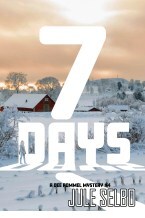
7 DAYS, A DEE ROMMEL MYSTERY will be released in a week or so. (The publisher had set March 19 at the release date and the email yesterday said end of February. Of course this is great, but also annoying because I had sent emails and Instagrams and Facebook announcements with the other date – ahhh well. The writer is always the last to know anything…)
But anyway – I am very excited. And looking back now at all the locations, research, chats, coffees, glasses of wine I had with people that were friends of friends, or that I cold-called to make sure the elements concerning the PLOT of 7 DAYS would be “authentic”. Since the Dee Rommel Mysteries take place in Portland Maine, I do spend a lot of time walking or driving around to get a sense of location, neighborhoods and meeting places. Places bodies can be found.
And then I make up some places to suit the story – but always try to keep the “Mainer” state of mind in play. In 7 DAYS, I have imagined a CROAKE SPORTS PARK, that, to me, is so Maine. Outdoorsy sports, hiking trails, vistas, un-farmed, unpolluted land next door to farms that have not been so lucky.
This Dee Rommel book takes place in the winter – so that was fun to explore.

I also explored the narrow narrow streets in “old Portland” – streets that are still creaking with age and history. Where someone could hide and be unnoticed because there’s no ‘chic-ness’ there – the gentrification bulldozer has yet to find them. That took up a good week of exploration, a lot of ideas/fun popped to mind.

I also got to “re-imagine” two of Portland Landmark eating/watering holes. I took elements of the “real places” but turned them on their head a bit – making them settings where dire things happen. My philosophy about setting the story in a “real” place, and loving that place and wanting to share it with readers – is this: If something “bad” happens there, use the facsimile.
Excited to see 7 DAYS on the shelves! Oh yeah – and the Dee Rommel Series is a CIBA finalist for best series of 2024. And here’s one of the reviews that has come in for 7 DAYS:
An exquisitely multi-layered plot that comes together seamlessly to deliver a spinetingling and startling climax. If you’re missing Sue Grafton’s Alphabet series, you’ll want to read Jule Selbo’s Dee Rommel books—they’re as comforting as they are exciting!”—Holly West, author of the Mistress of Fortune mysteries and the Anthony Award-winning editor of Killin’ Time in San Diego
February 7, 2025
Weekend Update: February 8-9, 2025
 Next week at Maine Crime Writers there will be posts by Jule Selbo (Monday), Joe Souza (Tuesday), Vaughn Hardacker (Thursday) and Gabi Stiteler (Friday).
Next week at Maine Crime Writers there will be posts by Jule Selbo (Monday), Joe Souza (Tuesday), Vaughn Hardacker (Thursday) and Gabi Stiteler (Friday).
In the news department, here’s what’s happening with some of us who blog regularly at Maine Crime Writers:
From Kathy Lynn Emerson: Good news! My collection of the complete short stories connected to my Face Down mysteries is now available in trade paperback and e-book formats. Lady Appleton’s World contains sixteen short stories set in the sixteenth century. This is the first time all of them have been published in one volume. It’s print-on-demand, so it won’t show up on brick-and-mortar bookstore shelves, but any bookseller or library can order a copy.
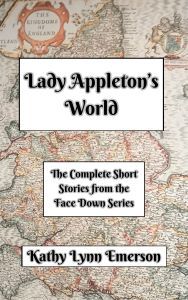
The ISBN for the paperback is 979-8-227-88201-1. It’s priced at $18.99 (the e-book is a bargain at $5.99).
An invitation to readers of this blog: Do you have news relating to Maine, Crime, or Writing? We’d love to hear from you. Just comment below to share.
And a reminder: If your library, school, or organization is looking for a speaker, we are often available to talk about the writing process, research, where we get our ideas, and other mysteries of the business, along with the very popular “Making a Mystery” with audience participation, and “Casting Call: How We Staff Our Mysteries.” We also do programs on Zoom. Contact Kate Flora
You Will Know A New Freedom—-If you Ever Stop Coughing

John Clark at 5 on a Monday morning, relishing the first decent breaths in a week. I have a new chicken and egg postulate; which came first, the perils of age, or the increasing ferocity of respiratory ailments?
I’ve been at the mercy of a hellacious cold/flu for more than a week, spending more time horizontal than vertical and imagining myself as Sisyphus, only having substituted endless tissues for the boulder. If there’s a more frustrating sensation than persistent weakness, I do not wish to experience it. Sleep comes in short bursts like commuter trains through a station…Two hours here, three, there.
Creative ideas are as slippery as eels in olive oil, barely perceptible before sliding into another amnesiac coughing jag. Ribs ache, sinuses throb, food tastes like not much of anything.
Even reading is unsatisfying. I must have a dozen books I’ve begun to read since this began, but have only finished one. That alone, tells me how severe this malady is.
One ray of hope in all this is my beginning to write again after two + months where the tank was damn near empty. I decided that in order to have any hope of creativity, I needed to dive into something as dark and foul as our current political mess.
What I came up with is, for lack of a better description, a new adult post-apocalyptic dystopian road trip It has two main characters, both of whom have decided they need to have new names to match their completely different world.
Here’s the premise: A rolling EMP (electromagnetic pulse) hits (likely triggered by a huge solar flare) beginning in the far east, wiping out all electronics as it flows toward the US. The orange-haired fool reacts by pushing the red button, sending hundreds of nuclear missiles aloft where their circuitry is fried by the EMP, leaving them hovering in the outer atmosphere. They begin to fall, some detonating, others simply releasing radioactivity. The two survivors meet when he rescues her from a gang of cannibalistic thugs and have to figure out how to survive.

I’m averaging 1,000 words a day(16,000) as of the time I publish this) and enjoying the freedom of simply writing it for my own enjoyment. I’m channeling the lyrics from a classic Ricky Nelson song as I do so.
But it’s all right now
I learned my lesson well
You see, you can’t please everyone
So you got to please yourself.
February 5, 2025
When Do You Get Your Ideas?
It’s a classic question at author readings – where do you get your ideas?
A better question, I think is when do you get your ideas? Where are you and what are you doing when your characters’ voices whisper in your ear, when a pedestrian passage takes poetic flight, when the plot twist reveals itself?
Sometimes these things happen to me when I’m in the shower. Relaxed under a warm spray, I’m a creative genius. I ought to find a waterproof whiteboard and mount it on the tiles, so I can jot down my thoughts in real time. Instead, I repeat the morning’s inspiration to myself until I’m dry and dressed and have pen in hand. Sometimes I can salvage at least part of it, but all too often, the idea dissipates like steam on the bathroom mirror.
Another regular writing meditation happens when I’m preparing a salad.

Not when I’m cooking generally, but as I wash lettuce, grate carrots, slice cukes and tomatoes. We love salad at our house—it’s on the menu pretty much every night—so my writer brain is poised when I pull the bowl off the top of the fridge and take a sharp knife in hand.
But the place I most often write in my head is at the beach.

That Diane and I regularly meander along the tide line may not come as a surprise to those of you who follow me on Facebook (soon to move over to BlueSky, a topic for another day) where I post photos most every week with the hashtags #Maine #SundayBeachWalks.
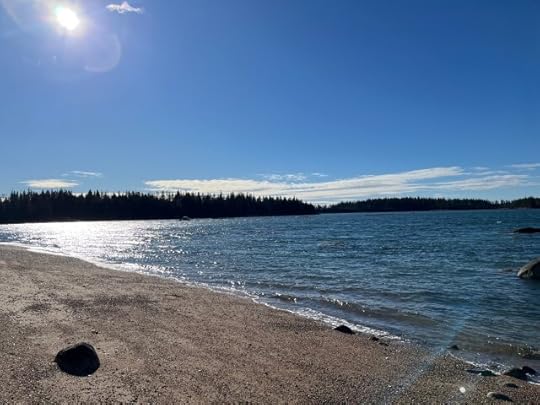
Winter and summer, spring and fall, a Maine beach is the perfect environment for me to hatch ideas, smooth plot wrinkles, and dream up fresh conflicts for my characters to navigate.
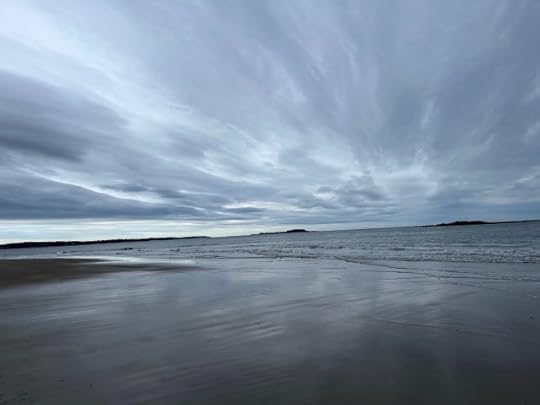
This winter I’m working on a couple of short stories and ruminating on a new novel, so there’s plenty to think about while we roam the sand on Sunday afternoons no matter the weather, watching sandpipers and scoters, listening to the rhythm of the surf.
My mind is there, yet not there, making room for the magic to happen.
When do you get your ideas?
Brenda Buchanan’s crime fiction reflects her experience as a journalist and lawyer. Her three-book Joe Gale mystery series—Quick Pivot, Cover Story and Truth Beat—feature a Maine newspaper reporter covering the crime and courts beat. Her short story, Means, Motive, and Opportunity, published in Bloodroot: Best New England Crime Stories, made the list of Other Distinguished Stories in Best American Mystery and Suspense 2022. You can find Brenda on the web at https://brendabuchananwrites.com
February 4, 2025
Perched on the Fence. Which Way Shall I Fall?
 Kate Flora: Another February. I used to joke that I always went crazy in February. I think we’ve solved that by doing more traveling in January. But the early months of the year are often a time when I find myself rethinking this writing life. Almost as long as I’ve been published, I’ve obsessed about my success or lack of it. Struggled with envy toward writers I know and love who’ve had more of it. Anguished about whether to bother to go on, despite my love of storytelling. Wondered if it is fair to the books to put them out there in the world if I’m not willing to do all the promotion they deserve.
Kate Flora: Another February. I used to joke that I always went crazy in February. I think we’ve solved that by doing more traveling in January. But the early months of the year are often a time when I find myself rethinking this writing life. Almost as long as I’ve been published, I’ve obsessed about my success or lack of it. Struggled with envy toward writers I know and love who’ve had more of it. Anguished about whether to bother to go on, despite my love of storytelling. Wondered if it is fair to the books to put them out there in the world if I’m not willing to do all the promotion they deserve.
Well…it’s February again and I’m having the debate again. The general consensus among my peers is that we’re writers and so we can’t help ourselves. But among the voices are those who say they gave it up. It was too frustrating to keep doing the “buy my book” dance. Too discouraging to launch a book into the world and then not have it read. Too disheartening to not get publisher support and having to do it all on their own.
Right now, I’m on the fence. I’ve been cooking the story for the next Thea, and as series writers know, our characters are like family and we want to know what’s happening in their lives. I want to know what little Mason is like as he grows up. I want to know how Thea and Andre will find the necessary balance in their lives between work and family. I want to know whether they’ll stay in their dream house after all the bad things that have happened there.
writers know, our characters are like family and we want to know what’s happening in their lives. I want to know what little Mason is like as he grows up. I want to know how Thea and Andre will find the necessary balance in their lives between work and family. I want to know whether they’ll stay in their dream house after all the bad things that have happened there.
Even as I’m imagining the plot for that book, I’m facing the dilemma of what to do with the four “books in the drawer” that are still unsold. Two dark police procedurals that are meant to be the first books in new series. The Darker the Night, a strong male detective tracking a serial killer, and Scarred, a strong female detective facing a mysterious killer who seems to be replicating the killings of her own siblings. A crazy book called Memorial Acts about two women dealing with losses in their lives that keep them from moving forward that I don’t know what to do with. And of course I’m still puttering around with the matchmaking dog book, Unleashed Love.
Like a lot of the writers I know, I don’t want to die and leave these poor books stuck in the drawer. As I’ve recently moved, according my physician friend, from young old to simply old, these are very real considerations. I expect that my beloved children, if faced with the chaos that is my office, will probably respond with a flame thrower unless I first embrace Swedish Death Cleaning.
 So . . . February. The temperature hovers in the single digits. The walk is slippery and I’m mindful of my doctor’s concern about my crumbling old bones. Even a trip out to refill the bird feeder feels slightly dangerous as I perch with snowy feet on a small stool so I can reach it. Of course, I’m a writer, however conflicted I feel, and so I know I can convert those small fears, that feeling of accepting risk, into something my characters can use. So yes. In February I will dither and consider giving it all up so that I can loaf and read and maybe take up a new hobby. But in March, I will very likely sit down at the computer and type: Chapter One.
So . . . February. The temperature hovers in the single digits. The walk is slippery and I’m mindful of my doctor’s concern about my crumbling old bones. Even a trip out to refill the bird feeder feels slightly dangerous as I perch with snowy feet on a small stool so I can reach it. Of course, I’m a writer, however conflicted I feel, and so I know I can convert those small fears, that feeling of accepting risk, into something my characters can use. So yes. In February I will dither and consider giving it all up so that I can loaf and read and maybe take up a new hobby. But in March, I will very likely sit down at the computer and type: Chapter One.
And a question: Is there someone out there who would like to be a beta reader? Let me know.
February 2, 2025
The Great Ice Storm of 1998
Kaitlyn Dunnett/Kathy Lynn Emerson here. Our group post last week had me going through my photos of winter in Maine, and that led, inevitably to pictures of a three-and-a-half-day weather event that was unprecedented here in Maine. It took place a little over twenty-seven years ago.
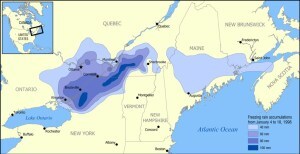
The Great Ice Storm of 1998 affected eastern Ontario, southern Quebec, New Brunswick, Nova Scotia, Maine, New Hampshire, Vermont, and northern New York State. Freezing rain started to fall in some places on January 5 and was still affecting others until January 9.
The population of the entire state in 1998 was 1.248 million. Between 700,000 and 840,000 of us lost power, a third of that number for more than a week. Some homes didn’t have power restored for over a month. The cause was ice building up on branches and power lines. Anything over a half inch can be catastrophic. It averaged 2.3622″ in the affected areas.
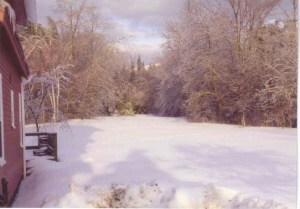
our back yard with ice

our back yard with normal snow cover
Since transmission towers had collapsed and thousands of utility poles were down, Governor (now Senator) Angus King declared a state of emergency. Help poured in from all over. Utility crews from North Carolina were flown into the former Naval Air Station in Brunswick in military planes and escorted to the areas most in need of them by members of the Maine National Guard.
Local outreach made a big difference, too. Most towns set up warming shelters. Neighbors helped neighbors, sharing generators and food. There were even people looking out for pets whose owners had to leave their homes for lack of heat.
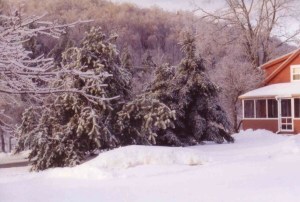
Shortly after the storm ended, commemorative T-shirts were available. The one I bought had a checklist on the back listing things we went “seven days without.” Power, showers, and coffee were included. I don’t remember the rest, but we were actually much better off than a lot of people in the state.

First came the unsettling crack of ice-laden branches breaking. Then our power went out, at 2:20 AM on the 8th. We lost our landline the next morning. I’m not sure we even owned cell phones back then, but we had a portable radio, a woodstove and plenty of firewood, a supply of water for drinking, washing, and flushing, and our camping gear, plus lots of candles and flashlights. We couldn’t take a shower but we could make coffee.
The TV went out along with the power and streaming wasn’t yet a thing. Neither was WiFi. I passed the time editing by hand (That Special Smile for the Bantam Loveswept line) and reading (Elliot Roosevelt’s Murder in the Blue Room and a friend’s manuscript). We ventured out to the Post Office on the morning of the 10th so I could mail out six ARCs of Face Down Upon an Herbal, which was published that April. We were in the grocery store, where they were using an adding machine to total up purchases and taking cash only payments, when the power in the village came back on. Everyone in the place cheered. At our house we had to wait until 7:40 PM, but we did some cheering then, too.
We pay close attention to weather forecasts here in Maine. Blizzard or ice storm, we’re ready for it, but I definitely prefer the snowy landscape of a normal winter.

fresh snowfall on the morning of February 1, 2025
Kathy Lynn Emerson/Kaitlyn Dunnett has had sixty-four books traditionally published and has self published others. She won the Agatha Award and was an Anthony and Macavity finalist for best mystery nonfiction of 2008 for How to Write Killer Historical Mysteries and was an Agatha Award finalist in 2015 in the best mystery short story category. In 2023 she won the Lea Wait Award for “excellence and achievement” from the Maine Writers and Publishers Alliance. She was the Malice Domestic Guest of Honor in 2014. She is currently working on creating new editions of her backlist titles. Her website is www.KathyLynnEmerson.com.
January 31, 2025
Weekend Update: February 1-2, 2025
 Next week at Maine Crime Writers there will be posts by Kaitlyn Dunnett/Kathy Lynn Emerson (Monday), Kate Flora (Tuesday), Brenda Buchanan (Thursday) and John Clark (Friday).
Next week at Maine Crime Writers there will be posts by Kaitlyn Dunnett/Kathy Lynn Emerson (Monday), Kate Flora (Tuesday), Brenda Buchanan (Thursday) and John Clark (Friday).
In the news department, here’s what’s happening with some of us who blog regularly at Maine Crime Writers:
An invitation to readers of this blog: Do you have news relating to Maine, Crime, or Writing? We’d love to hear from you. Just comment below to share.
And a reminder: If your library, school, or organization is looking for a speaker, we are often available to talk about the writing process, research, where we get our ideas, and other mysteries of the business, along with the very popular “Making a Mystery” with audience participation, and “Casting Call: How We Staff Our Mysteries.” We also do programs on Zoom. Contact Kate Flora
Lea Wait's Blog
- Lea Wait's profile
- 508 followers



